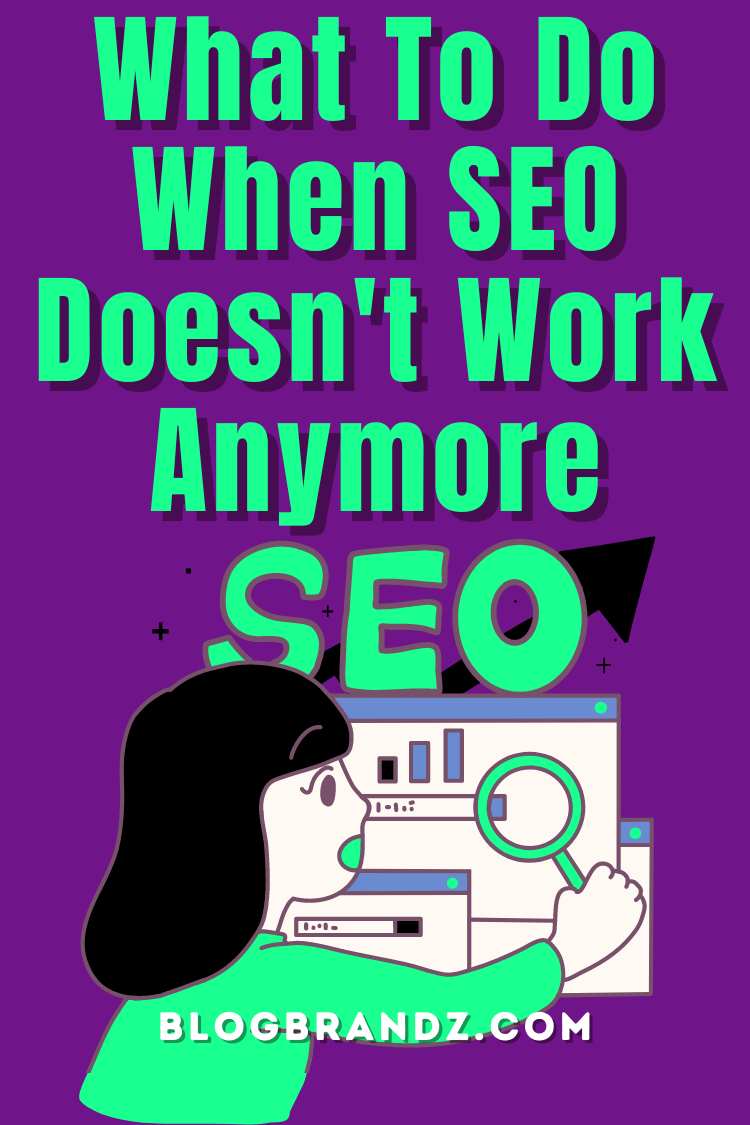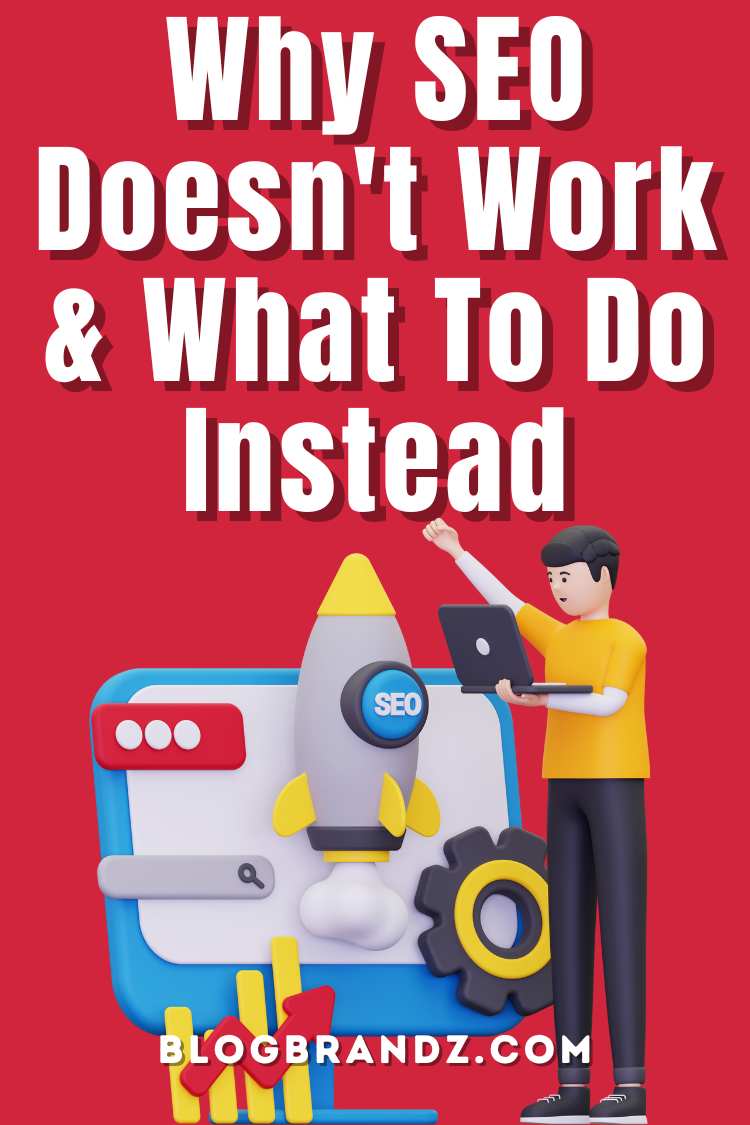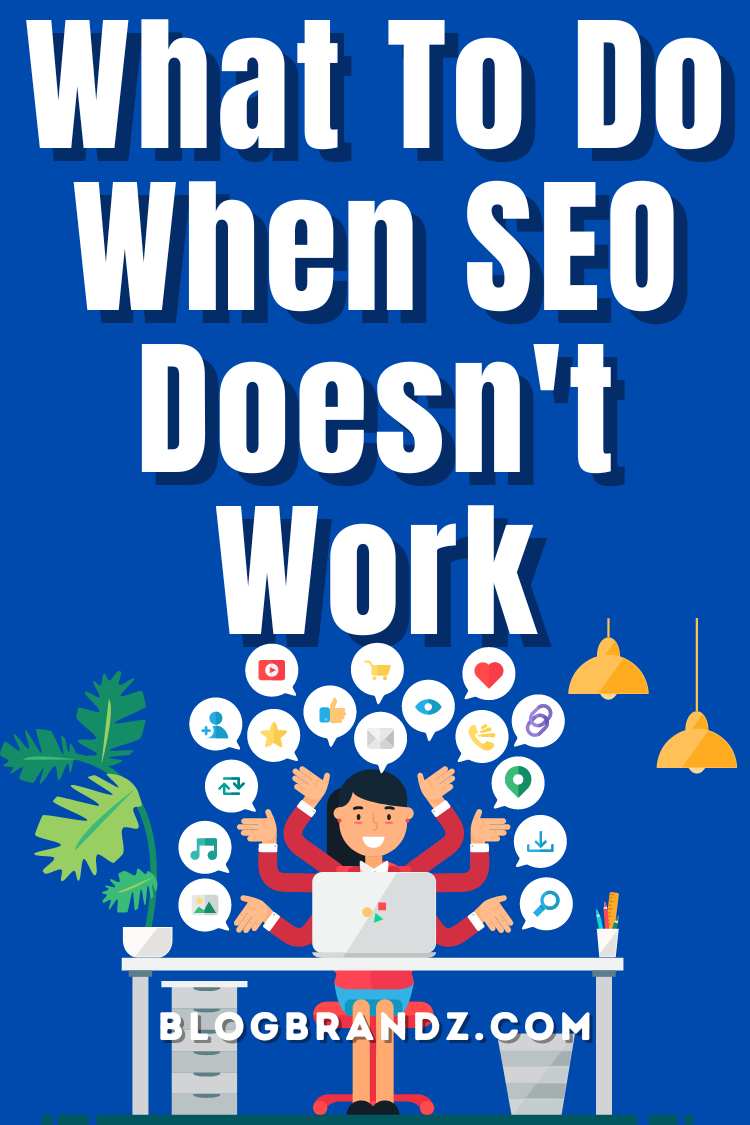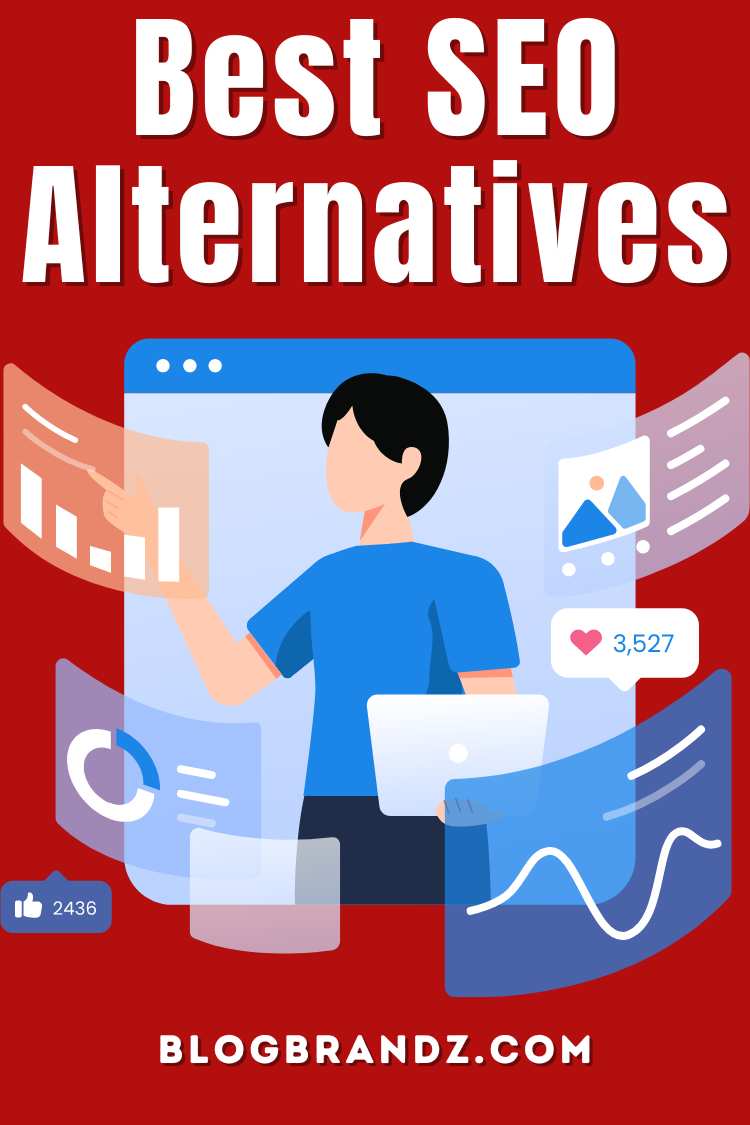Discover effective SEO alternatives to boost visibility and traffic. Explore alternatives to SEO campaigns that may offer better results for your business.
If you’ve noticed that SEO doesn’t work like it used to, you’re not alone. In the competitive digital marketing landscape, relying solely on SEO to drive traffic and generate leads may not be enough, or suitable, for many businesses.
With constant algorithm changes and intense competition, many businesses are questioning the effectiveness of SEO and exploring other marketing strategies that can deliver better, more consistent results in today’s digital landscape.
While SEO has its merits many factors can limit its effectiveness. Diversifying your website’s traffic sources is essential because relying solely on SEO can limit your reach and growth, especially in an era where SEO doesn’t work for many niches.
So if your website traffic flatlined after the last Google algorithm update, stop wondering why SEO doesn’t work anymore and consider these alternatives to expensive, time-consuming SEO campaigns.
This article explores alternative marketing strategies that can provide immediate visibility and foster direct connections with potential customers. By leveraging these alternatives to SEO, businesses can diversify their marketing efforts and achieve sustained growth in an ever-evolving marketplace.
Contents
6 Reasons Why SEO May Not Work For Your Business
While SEO (Search Engine Optimization) is a powerful tool for improving online visibility, it’s not a one-size-fits-all solution. Here are some reasons why SEO might not be the answer for everyone, along with alternatives to consider:
#1. Slow results
SEO is a long-term strategy that often requires months of consistent effort before yielding significant results. For example, if you’re launching a new product or running a limited-time promotion, waiting for organic search rankings to improve may not generate the immediate traffic or leads you need.
SEO involves optimizing content, building backlinks, and earning authority, all of which take time to impact search engine rankings.
In contrast, Pay-Per-Click (PPC) advertising or social media campaigns can deliver instant visibility and traffic, making them more practical for businesses needing quick results.
#2. High competition
In highly competitive industries, achieving top search engine rankings can be daunting, particularly for new or smaller businesses. Established competitors with larger budgets often dominate the search landscape, investing heavily in SEO to secure top positions.
For instance, if you’re entering a saturated market like online retail or digital marketing, competing against well-known brands with years of SEO investment can be overwhelming.
These companies may have thousands of backlinks, extensive content, and significant domain authority, making it difficult for your site to rank well. This intense competition can lead to frustration and limited visibility.
#3. Algorithm changes
Search engine algorithms are constantly evolving, with updates often causing significant shifts in website rankings. This unpredictability means that strategies that successfully boost your site’s visibility today might lose effectiveness tomorrow.
For example, a Google algorithm update might devalue certain types of backlinks or change how content is ranked, leading to sudden drops in traffic for websites that rely on these tactics.
Such changes create an unstable traffic source, making it challenging for businesses to maintain consistent search rankings. This volatility can disrupt long-term planning and necessitate frequent adjustments to your SEO strategy, consuming valuable time and resources.
#4. Continuous investment
SEO demands continuous investment, as it’s not a one-time task but an ongoing process. To maintain and improve search rankings, businesses must consistently create fresh content, build quality backlinks, and optimize their websites for new search algorithms and user behaviors.
This requires a significant commitment of time, money, and effort. For example, regularly updating blog posts, acquiring new backlinks, and performing technical audits are necessary to stay competitive.
Without ongoing investment, your site may lose its rankings over time, causing a decline in traffic and visibility. This continuous demand can be particularly challenging for smaller businesses with limited resources.
#5. Limited control
With SEO, you lack full control over how search engines rank your site, leaving you vulnerable to external factors. Algorithm updates can drastically alter ranking criteria overnight, causing sudden drops in your site’s visibility despite consistent efforts.
Additionally, actions taken by competitors—such as aggressive link-building or content updates—can affect your position in search results, often unpredictably.
For instance, a competitor may publish a series of high-quality articles or secure influential backlinks, pushing your site down the rankings. This lack of control can lead to fluctuating traffic making it difficult to rely solely on SEO for consistent results.
#6. Not ideal for certain businesses
SEO may not be the best fit for businesses offering highly specialized or niche products, as they often face limited search volume for relevant keywords.
For instance, a company selling custom scientific equipment might find that only a small, specialized audience searches for their products, making it difficult to drive significant organic traffic through SEO alone.
Additionally, local businesses that thrive on direct outreach or word-of-mouth—like a neighborhood bakery or a local contractor—may find that traditional SEO doesn’t adequately capture their customer base.
Focusing on targeted marketing strategies like local advertising, community engagement, or networking might be more effective.
8 Effective Alternatives To SEO Campaigns
Instead of relying solely on SEO, consider diversifying your marketing efforts to include strategies that offer more immediate and controllable results.
These SEO alternatives allow you to maintain greater control over your brand’s visibility and engagement, providing multiple avenues to attract and convert customers while reducing dependence on search engine rankings.
#1. Pay-per-click (PPC) advertising
Paid advertising, particularly Pay-Per-Click (PPC) campaigns, offers a fast and effective way to gain immediate visibility online.
Unlike SEO, which can take months to show results, PPC ads on platforms like Google Ads or social media channels can generate instant traffic by placing your business directly in front of targeted audiences.
For example, if you’re launching a new product, a well-crafted PPC campaign can ensure your ads appear at the top of search results or in users’ social media feeds, driving immediate clicks and conversions.
PPC also allows precise audience targeting based on demographics, interests, and behaviors, ensuring that your ads reach the most relevant potential customers to maximize return on investment.
Resources:
Click here to hire a PPC advertising specialist
#2. Content marketing
Content marketing emphasizes creating valuable, relevant content that deeply resonates with your audience. Instead of depending solely on SEO, you can diversify your approach by promoting content through various channels like social media, email marketing, and partnerships with influencers or industry leaders.
For example, a blog post offering expert tips in your industry can be shared across your social media platforms, boosting engagement and reach. Collaborating with influencers who share your content can introduce it to new, relevant audiences.
Leveraging email marketing to distribute your content directly to subscribers ensures it reaches those most interested in your insights, driving higher engagement and brand loyalty.
Resources:
Click here to get a content marketing review
#3. Social media marketing
Social media marketing allows businesses to leverage platforms like Facebook, Instagram, Twitter, and LinkedIn to build a community and engage directly with their audience.
By sharing valuable content, responding to comments, and participating in discussions, you can create a strong connection with your followers, fostering brand loyalty.
For example, hosting live Q&A sessions or interactive polls can encourage audience participation and feedback. Social media also serves as an effective tool for driving traffic to your website by sharing links to blog posts, product pages, or special promotions.
Additionally, targeted ads on these platforms can enhance brand awareness and reach specific demographics, making it a powerful strategy for expanding your online presence.
Resources:
- Social Media Marketing & Management Masterclass
- Social Media Marketing: Ads on 10+ Platforms
- Hire a Social Media Marketing Assistant
Click here to hire a social media manager
#4. Pinterest marketing
Pinterest is an excellent alternative to Google SEO, especially for businesses focused on visual content or targeting niche audiences.
Unlike Google, Pinterest operates more like a visual search engine, where users actively seek inspiration, ideas, and products. This makes it a powerful platform for driving organic traffic directly to your website.
One of Pinterest’s key advantages is its longevity—pins can generate traffic for months or even years later, unlike Google, where content often needs constant updates and re-optimization.
Additionally, Pinterest allows you to reach highly engaged users who are more likely to take action, such as making a purchase or signing up for a service, because they are already in a discovery and planning mindset.
Another benefit is that Pinterest’s algorithm is less volatile than Google’s, offering more consistent visibility for your content. It also provides opportunities for targeted advertising and promoted pins, which can further boost your reach.
Pinterest can be a more effective and reliable traffic source for brands with visually appealing products or content than traditional Google SEO.
Resources:
- Why New Bloggers Should Not Ignore Pinterest Search
- Best Pinterest Bloggers Courses
- Pinterest Marketing & Advertising: Beginner To Advanced
- Google SEO Vs Pinterest SEO For Bloggers
- Hire a Pinterest Manager
Click here to hire a Pinterest manager
#5. Email marketing
Email marketing is a strategic approach to building and nurturing an email list, allowing businesses to maintain direct contact with potential and existing customers. Create a database of prospects by collecting email addresses through sign-up forms, newsletters, or promotions.
Regularly sending personalized content, updates, and offers keeps your brand top-of-mind and fosters strong relationships. For example, sending targeted emails that showcase new products or exclusive discounts can encourage repeat business and drive conversions.
Additionally, automated email sequences, like welcome series or abandoned cart reminders, can effectively nurture leads and guide them through the purchasing journey, all while reducing reliance on search engines for visibility.
Resources:
Click here to hire an email marketing specialist
#6. Influencer partnerships
Collaborating with influencers or industry leaders can significantly enhance your brand’s visibility and credibility, especially in niche markets where traditional SEO may fall short.
By partnering with influencers who resonate with your target audience, you can tap into their established follower base, allowing for authentic promotion of your products or services.
For example, a skincare brand might collaborate with beauty influencers to showcase their products through tutorials or reviews, effectively reaching potential customers who trust the influencer’s recommendations.
This approach drives traffic and sales and fosters brand loyalty by associating your brand with trusted voices in the industry. Influencer partnerships can be valuable in niche markets, where personalized and relatable endorsements can substantially impact.
Resources:
Click here to collaborate with influencers
#7. Growth hacking strategies
Growth hacking strategies offer a compelling alternative to traditional SEO, particularly for startups seeking rapid growth with limited resources.
Unlike SEO, which requires time to yield results through organic traffic, growth hacking leverages creative marketing tactics and data-driven approaches to generate quick outcomes. By emphasizing user acquisition, retention, and virality, businesses can use unconventional strategies like referral programs and social media campaigns to drive engagement.
Additionally, growth hacking focuses on testing and iteration, enabling companies to adapt quickly based on real-time feedback and analytics. This agile approach enhances customer engagement and provides insights into user behavior, allowing businesses to refine their offerings.
Growth hacking can complement or replace SEO in competitive industries, helping businesses build a loyal user base and establish a strong market presence.
Resources:
- How to Use Growth Hacking Strategies
- Growth Hacking with Digital Marketing & AI
- Complete Growth Hacking & Conversion Course
- Hire a Growth Hacking Consultant
Click here to hire a growth-hacking consultant
#8. Affiliate marketing
Affiliate marketing involves creating partnerships with affiliates who promote your products or services in exchange for a commission on sales generated through their referrals.
For example, Impact’s Partnership Cloud helps brands increase revenue and ROAS and manage their partnerships at scale. This performance-based model allows you to expand your reach without upfront costs, as you only pay for sales or leads.
For instance, a fashion retailer might collaborate with fashion bloggers or social media influencers who share unique affiliate links, directing their audience to the retailer’s website.
This drives traffic and leverages the affiliate’s credibility and audience engagement to boost sales. Finding the right affiliates to help you promote your products can increase brand exposure and generate revenue while diversifying your marketing strategy.
Resources:
Hire an affiliate recruitment specialist
#9. Local marketing strategies
For local businesses, implementing targeted local marketing strategies is essential for attracting customers within the community. Attending community events, farmers’ markets, or local festivals, allows you to engage directly with potential customers and build relationships.
Additionally, partnering with other local businesses can create mutually beneficial promotions, such as co-hosting events or offering bundle deals, which can expand your reach and enhance visibility.
Optimizing your presence on platforms like Google My Business is also crucial; this ensures that your business appears in local search results and Google Maps, making it easier for customers to find you.
Encouraging customer reviews and sharing local content can further enhance your credibility and strengthen your connection with the community, ultimately driving more foot traffic and sales.
Resources:
Click here to hire a Google Business profile manager
#10. Direct outreach
In B2B or niche markets, direct outreach can be a highly effective strategy, often surpassing the benefits of SEO. Cold emails, phone calls, or professional networking platforms like LinkedIn enable you to communicate directly with potential clients, allowing personalized and targeted messaging.
For instance, crafting a well-researched cold email that addresses a specific pain point for a business can lead to meaningful conversations and potential partnerships. Additionally, leveraging LinkedIn for outreach provides access to decision-makers and industry professionals, facilitating valuable connections.
This proactive approach accelerates lead generation and allows you to tailor your pitch to the unique needs of your audience, resulting in higher conversion rates and stronger relationships.
Resources:
- How To Do Cold Email Outreach
- LinkedIn B2B Marketing Best Practices
- Hire a LinkedIn Outreach Assistant
Click here to hire a LinkedIn outreach assistant
Exploring SEO alternatives ensures you stay competitive even when search engines change algorithms and you’re left wondering why SEO doesn’t work for your site.
By considering these alternatives to SEO campaigns, you can diversify your marketing strategy and ensure a more balanced approach to driving traffic and growing your business.
© 2024, Priya Florence Shah. All rights reserved.
Priya Florence Shah is a bestselling author and an award-winning blogger. Check out her book on emotional self-care for women. Priya writes short stories and poetry and chills with her two-legged and four-legged kids in her spare time.
Discover more from Business & Branding Tips
Subscribe to get the latest posts sent to your email.





















